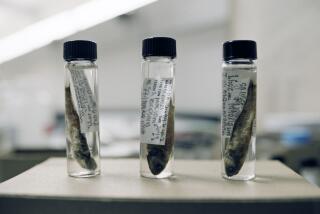Breast Cancer Study Clears DDT, PCBs : Health: New research by Kaiser contradicts earlier findings. But the report in no way suggests that these chemicals are safe, an epidemiologist warns.
- Share via
Contradicting previous findings, a major new study finds no link between breast cancer and exposure to the pesticide DDT or to the industrial chemicals known as PCBs, Kaiser Permanente researchers in Oakland report today.
Several previous studies involving small numbers of women had suggested such a link, frightening women who live in proximity to farming regions and industrial chemical companies. Last week, a study showed that women living near large chemical companies on Long Island, N.Y., had an increased risk of developing breast cancer after menopause.
Although the new study, which appears in the Journal of the National Cancer Institute, leaves open the possibility that other industrial chemicals may play a role in the disease, it seems to eliminate DDT and PCBs as a suspect.
Epidemiologist Nancy Krieger and her colleagues at Kaiser and the Mt. Sinai School of Medicine in New York City studied 300 women from various ethnic groups, using frozen blood samples obtained when the women enrolled in the Kaiser program in the 1960s, before DDT was banned and the use of PCBs was restricted.
Overall, they found no apparent link between levels of the two chemicals in the women’s blood and the incidence of breast cancer. Women with the highest levels of the chemicals were not more likely to have breast cancer and those with the lowest levels were not less likely to have it.
“This is not the definitive study,” Krieger said, “but I think it helps set a new standard for future studies.”
Epidemiologist Robert Hoover of the National Cancer Institute, which funded the study, complimented its design, but cautioned that the study does not completely rule out the role of the two chemicals. “I wouldn’t have written (the conclusions) so strongly negative,” he said. “It turns out this is a more complex question than people thought.”
Krieger also noted that her results do not absolve DDT and PCBs of the other risks they pose. “It’s essential to remember that they have already been shown to be carcinogens and to pose health risks to humans and to other animals,” she said. “This study in no way suggests that these chemicals are safe.”
The concern about the effects of DDT and polychlorinated biphenyls--PCBs--is based on their tendency to dissolve readily in fat and accumulate in fatty portions of the body, such as the breast.
At least five small studies have attempted to link the chemicals, called organochlorines, with breast cancer, with mixed results. Among the most recent was a study of 58 women with breast cancer conducted by epidemiologist Mary Wolff of Mt. Sinai. Using blood samples obtained an average of six months before the diagnosis of breast cancer, Wolff found no link to PCBs, but a significant association with DDT.
But the problem with Wolff’s study and others, Krieger said in an interview, is that breast cancer itself can mobilize organochlorines in breast tissue, causing them to appear in the blood in higher concentrations. Six months before the diagnosis of breast cancer, many of the women in the New York study undoubtedly already had cancer and could have had higher blood levels of organochlorines because of it, she said.
That problem was eliminated in the Kaiser study, in which Wolff also participated, because the blood samples were collected, on average, 14.2 years before the cancer was diagnosed. Kaiser’s large clientele also allowed the researchers to select a broader ethnic representation, more characteristic of the population at large, including 50 whites, 50 African Americans, and 50 Asians with breast cancer. They also identified an equal number of controls without the disease. In contrast, 80% of the women in Wolff’s earlier study were white--a limitation Wolff acknowledges.
When the data for all three races was combined, there was no apparent risk from the two chemicals. African American women with high blood levels of the chemicals appeared to have a slightly higher risk of developing breast cancer, but the increase was not statistically significant. Nonetheless, Hoover and others urged that further studies be done to determine if that increased risk for such women is real.






